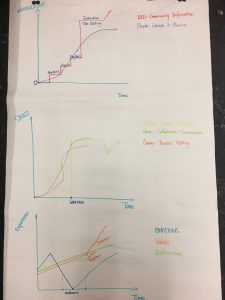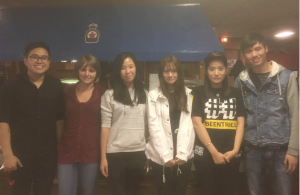Articulate your Weekly Objectives and Achievements
We had successfully met with our Community Partner on October the 26th, as planned. The president of Legion T.V, Peter Marola, was kind enough to sit down and have a meeting with us to explain the history of this particular Legion and its internal processes. As the meeting progressed, we explained to Peter Marola what the intentions of our research project was. Through our discussion with Mr. Marola, we were trying to gauge if any of the organizational goals of his Legion would coincide with the Vancouver Food Strategy, so that further collaboration may happen within a community food system framework, and if the Legion was open to asset based community development.
After our discussion, the President had made it clear to us that to his organization the notion of food security and food justice is important, however that his business is purely within the financial realm. The support for the community and their members reach beyond the local region. This is important, as listening to the community partner and their needs, and making sure they are not imposed on is much more essential. In terms of achieving our weekly goals, such meeting with the community partner, and establishing an understanding of what their organizational goals are, we have succeeded. We now know that their organizational goals at the moment do not match those of the Vancouver Food Strategy, nor are they open to Asset Based Community Development within their branch. However, we learned that this Legion does use the food made through their kitchen infrastructure and the food from restaurant donations to serve food to their community members during events. After the meeting, the President gave us a tour of the facilities, and we were also free to roam and observe. Our next objective is to analyze the Legion branch physically as a food asset, in terms of infrastructure and land-space utilized. Although the President made it clear that their goals do not align, however we can still process the data and give a report for future reference.
Describe and reflect on your group’s Moment of Significant Change workshop from tutorial session (include an image of the graphs your group created).

Since this project started, our group has been through a lot of ups and downs. We are thankful for the Moment of Significant Change workshop because it not only helped us reflect on our actions throughout the course but it also allowed us to collaboratively come up with ways to move forward.
At the beginning of the course, our knowledge on the background information and theories for our project were very minimal, as shown in our graph. We were familiar with terms such as food sovereignty and food security from our previous Land and Food Systems classes. However, we did not know what approaches to use in order to deal with issues such as these. This made it difficult for our group to understand what was expected of us in order to accomplish our community-based project. We overcame this block in knowledge when we learned about concepts such as Asset-Based Community Development through our class readings. Mathie mentioned in their paper about assest based community development (ABCD) that there are no clear guidelines to ABCD but one of the more important points is to “collect stories of community successes of the past and analyse the reasons for success” (Mathie & Cunningham, 2003). With our new knowledge of Asset-Based Community Development, we feel confident that this approach will be able to make an impact in a community, especially in working towards solving issues such as food security.
Having inspiring guest speakers teach our class about important issues has enhanced our group members’ passion for helping our community. One of the speakers that stood out the most for our group was Julian Napolean. As a member of the Dane-zaa Nation, located in the Peace River region of British Columbia, Julian has witnessed and felt the impact of colonization that his community constantly faces. For example, one of our group members, Sarah, has lived in BC her whole life and was shocked to hear about the problems that Indigenous people face, especially since the land that she lives on was once their land. Hearing about Julian’s person stories with these issues made Sarah realize the significance of trying to help protect their land and their culture.
Interviewing the President of the legion, Peter Marola, not only helped us learn a lot about the Legion but it also was a great learning experience for our group members in regards to the interview process. We were surprised by how much new information we acquired during the interview even though we had done research beforehand. Interviewing allowed us to get information that we would never have been able to find online, such as the specific organizations that the Legion has donated to. To prepare for the interview, we had printed out a list of questions to ask the Peter Marola, however during the interview we realized the importance of going over what the purpose of the interview with the interviewee. Since we did not prepare something to say to familiarize the interviewee with our project’s goals, we had to improvise. Dan Barber’s story on This American Life, on his failed attempts to replicate a way to make foie gras in a different environment made us feel a little better about adapting to changes (Glass, 2011). Things do not always go as planned, therefore we must be able to accept that and think quickly on how to move on. We were able to explain the project to Peter Marola, however we now know that if we ever have to interview someone in the future that it would be helpful to come with this prepared. We were very grateful to interview the President of the Legion since he was very knowledgeable about the Legion and we learned how talking to an expert is a great way to learn more about a topic.
Our group dynamic improved over time. When we started working on the project, we did not know each other very well and therefore could not assess each other’s strengths and weaknesses. After working with each other, we figured out how to collaborate effectively. For example, for our first blog post, we did not assign someone to be the editor nor did we set a timeslot to edit what we wrote – this gave us little time to edit and we felt rushed. Remembering a quote from our reading, “Without a certain amount of anxiety and risk, there’s a limit to how much learning occurs” (Shulman, 2005, p. 18). We took this to heart and sought new ways to improve. We decided to finish our individual portions by a deadline and assigned one person to review leaving enough time for everyone to go back and fix their errors. We plan to keep learning from our mistakes and continue to communicate with each other so that we can not only achieve the best project outcome but also gain teamworking skills.
Describe your groups strategy for successful project completion (the Graceful Dismount).
In terms of the graceful dismount, our group’s strategies for successful project completion are to work together to clarify and analyze the notes that we got from our interview at the Legion and to ensure that each of group members understands the information collected. During the interview, we had two members asking questions, one person voice recorded the interviewee and everyone else took notes to ensure that no important information was missed. To gain further knowledge about the Legion, we will research and do an archived analysis. We will then summarize our data, which will help us under the concept and theories even more. We will also be meeting as a group more frequently in order to have a better communication between group members. This will enable us to make sure that our group members will contribute an equal amount to the project. Furthermore, we will continue to use Slack, which is a messaging app, in order to ensure everyone is on track with their tasks. Through increased amount of communication, members can help each other solve individual difficulties with the project and we will be able to make sure our everyone is aware of what needs to be done and when it needs to be done. Communication also allows us to use the diverse opinions and ideas that our group members can offer. We believe that better communication and equal work distribution will improve collaboration and will greatly contribute to making a successful project.
References
Glass, I. (2011). 452. Poultry Slam 2011. Retrieved 7 November 2016, from https://www.thisamericanlife.org/radio-archives/episode/452/poultry-slam-2011?act=3#play
Mathie, A., & Cunningham, G. (2003). From clients to citizens: Asset-based Community Development as a strategy for community-driven development. Development in Practice, 13(5), 474–486.
Shulman, L. S. (2005). Pedagogies of uncertainty. Liberal Education, 91(2), 18–25. Retrieved from http://files.eric.ed.gov/fulltext/EJ697350.pdf
